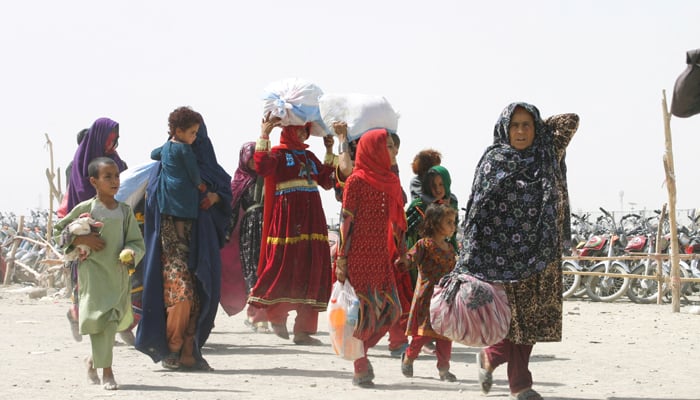In an effort to strengthen measures against illegal individuals from abroad, the interim government has set a deadline of November 1 for immigrants residing in the country unlawfully. The government has issued a warning that actions will be taken against these individuals after the specified deadline.
Interim Interior Minister Sarfraz Bugti, addressing a press conference following an apex committee meeting on the National Action Plan (NAP), revealed that the committee had unanimously decided on the November 1 deadline for illegal aliens to voluntarily depart the country. The high-level meeting, chaired by Caretaker Prime Minister Anwaar-ul-Haq Kakar, saw the participation of top civil and military leaders in Islamabad.

This decision comes in the wake of a recent deadly suicide blast in Mastung, Balochistan, where over 60 lives were lost. Many recent acts of terror in Pakistan have been attributed to Afghan nationals or have taken place on Pakistani soil.
According to a statistical report released by the independent think tank Pakistan Institute for Conflict and Security Studies (PICSS), the first half of 2023 witnessed at least 271 militant attacks, resulting in 389 fatalities and 656 injuries. Terrorism incidents in the country increased by a staggering 79% during this period.
During the conference, the caretaker interior minister disclosed that Afghan nationals were responsible for 14 out of the 24 suicide bombings that occurred in the country this year. He issued a stern warning to illegal immigrants, urging them to leave Pakistan by November 1 or face compulsory expulsion.
Bugti pointed out that approximately 1.73 million Afghan nationals in Pakistan lacked legal documentation to remain in the country, among a total of 4.4 million Afghan refugees residing in Pakistan.
Furthermore, Bugti announced that all state law enforcement agencies would be mobilized to take action against illegal foreign nationals, who would be deported after the November 1 deadline. He emphasized that properties and businesses operated by these illegal foreign nationals would also be confiscated once the deadline expired. Any Pakistani citizens involved in illegal businesses and property transactions with these foreign nationals would face legal consequences.
To oversee these actions, a task force has been established within the Interior Ministry, consisting of officials from law enforcement and intelligence agencies. Bugti stressed that the safety and security of Pakistan’s citizens were of paramount importance to the government. The task force would conduct a crackdown on individuals with fraudulent Computerized National Identity Cards (CNICs) and would work to confiscate properties owned by foreigners.
The minister added that the National Database & Registration Authority (Nadra) had been directed to promptly cancel fake CNICs. He also warned of strict measures against those attempting to alter Nadra’s family tree records to obtain citizenship fraudulently, stating that DNA testing would be used to confirm nationality suspicions.
In addition to these efforts, a universal helpline number and a web portal would be launched to collect information regarding illegal immigrants, CNIC fraud, smuggling, and hoarding. Bugti encouraged people to share information anonymously through these channels.
In a related development, the caretaker government announced that nearly 1.1 million foreigners residing illegally in Pakistan would be expelled due to security concerns. The eviction plan includes individuals who have not renewed their visas.
In subsequent phases, individuals with Afghan citizenship and residence cards will also be deported. Officials cited concerns about the security threat posed by illegally residing foreigners, particularly Afghan citizens involved in funding, facilitating, and smuggling terrorists. It was noted that 700,000 Afghans had not renewed their residence permits in Pakistan.
The Ministry of Interior, in consultation with stakeholders and the Afghan government, formulated the expulsion plan. The ministry also issued directives to compile records of unregistered Afghan residents and prepare transportation plans for their return to the Afghan border. Authorities were tasked with expediting the registration of Afghan nationals living in Pakistan.






